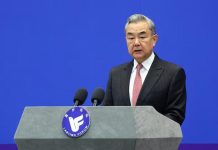Africa-Press – Mauritius. State House Connection: Compromising Documents’; ‘Dewdanee, Biscuits… The MSM prepares the response’; ‘Medication abuse: Adsu is investigating new trafficking’.
here are some press titles that have appeared in recent days.
Not very happy, is it? Can you tell us about the image of our society that this reflects? Catherine Boudet: The image. . . It’s an obsession. This notion of “image” of the country.
This is an argument that comes up every time scandals come to light. The idea behind this is that it is important to make a good impression on foreign investors.
In reality, it is an argument used to muzzle protest and prevent the revelation of scandals, by making those who want to reveal them feel guilty or who simply want to question power.
In fact, this notion of “image” is based on a schizophrenic logic because instead of worrying about cleaning up political and public life, it encourages the perpetuation of a clientelist and corrupt system which can survive as long as it does not appear in broad daylight.
This is a logic that could work well before the era of the Internet and social networks, when it was still possible to camouflage local political turpitude “downstairs” and sell a heavenly image of the country, even if it was out of touch with reality. This is less and less possible now with the flow of information at high speed and on a large scale.
All these current scandals, whether it is the Alvaro Sobrinho affair, the Angolan billionaire with investments of dubious origin and his connection with the State House, that of the “biscuitgate” or allegations of marketing by someone close to power for tourists and certain administrations, the latest record drug seizure to date with the discovery of a network and its alleged political connections, these are just more episodes in the soap opera of local neo-patrimonialism, with its procession of favouritism, corruption and banditry.
But we reach unparalleled heights when the Presidency of the Republic is splashed. It is the holiest institution in the country, symbolizing the pinnacle of the state and the preservation of republican fairness above politics.
* With all the press headlines and comments in the media but especially on social networks which viralize and amplify these facts, we are still limited to the symptoms and very little to the roots of the evil.
What to do ? Do we have answers to this question? It is true that online news and social networks, by favoring the spread of information, neutralize to a certain extent the omerta (the law of silence) which prevailed a decade ago on business.
Nevertheless, the diktat of information and computer technology favors the expression of epidermal reactions to the detriment of fundamental reflection.
This intellectual laziness that characterizes modern thought is further amplified in Mauritius by the absence of teaching methods of analysis at school and university, and by deficiencies in terms of political culture. As a result, we can observe on Facebook, for example, that Mauritians tend to react more to certain news than to others.
They are very reactive to matters of morals or ethnicity, but much less to questions of general interest, such as the destruction of the environment, unless they affect them personally, such as access to drinking water.
. Moreover, they are content to react but very few bother to think deeply. As for acting, even less! Or, occasionally. So, effectively, we limit ourselves to a denunciation without moving to political action.
As for the roots of the evil, they are so deeply integrated into the national unconscious that for the moment they are struggling to emerge from the collective consciousness.
To answer your question “what to do?” », in my opinion, we must continue to teach about corruption, nepotism and neo-patrimonialism. This will help Mauritians realize how these phenomena destroy the foundations of a democratic society, and especially how they operate.
Unfortunately, sociologists and political scientists do not assume their responsibility at this level. So you are talking about a Mauritian-style neo-patrimonialism? Yet it is a phenomenon that concerns more Africa, don’t you think? How would you define this Mauritian-style neo-patrimonialism?
The definition of neo-patrimonialism is when a clique centered around the person of a leader appropriates the machinery of political power, distributing privileges and prebends and confiscating economic and political resources for its own benefit.
Neopatrimonialism is also characterized by the maintenance of a network of customers who will confiscate economic modernization for the benefit of these happy few.
We can already see that this definition fully applies to the Mauritian situation, regardless of the government in place. One clique just chased the other but the methods are the same.
* Going back to the allegations in relation to the ‘State House Connection’: do you think that Ameenah Gurib-Fakim disqualified herself from being President of the Republic for having mixed up the Mauritian state with such a controversial person as Alvaro Sobrinho , knowing that nothing illegal has been established against this Angolan investor so far? Although we know that a police investigation is underway regarding allegations of false information in the case of an application for obtaining a license in the Investment Banking sector…
Regarding the questionable provenance of Alvaro Sobrinho’s funds, of course there is no conviction in the file of the Angolan investor. That said, there could still be reasonable suspicions that it was a risky contact if one becomes aware of even the toxic loans affair of the Banco Espírito Santo Angola (BESA) revealed by the Angolan newspaper Maka Angola in May 2014.
These toxic loans would have been contracted for an amount of 6.5 billion USD by the BESA – of which nearly 200 million USD for the benefit of Alvaro Sobrinho himself – while Alvaro Sobrinho was chairman of the executive committee of the bank.
. These are too specific elements for us to adhere to the argument that they were invented by a carrionful press overflowing with imagination.
Be that as it may, we are no longer at the stage of reasonable suspicion but of damage control. The machine is launched for an investigation into the legality of the operations of Alvaro Sobrinho in Mauritius. A police investigation is finally underway and the opinion of the Public Prosecutor’s Office has been requested.
And that’s what was needed to try to clear things up because the government’s attempts to downplay this matter are certainly aimed at preserving the image of the country, but they can do more harm than good for the credibility of Maurice as they are sewn with white thread.
We remember the caricatural episode of the number 2 of the government trying to defend the Angolan investor with the argument that Alvaro Sobrinho gave him his word that the money invested in Mauritius is clean. As for the controversial position of the President of the Republic in this matter, section 28(4) of the Constitution is crystal clear:
“Where a person is elected to the office of President, he shall not, whilst in office, (a) hold any other office of emolument, whether under the Constitution or otherwise; (b) exercise any profession or calling or engage in any trade or business.
In other words, even if the exercise was unpaid, it was, in my opinion, unconstitutional to engage, even voluntarily, in the activities of Planet Earth Institute Ltd, especially since the organization was registered as a limited company in England, as several weeklies have recently revealed.
So, at this level, the argument of the “good intentions” that would have animated the President is not enough. It is all about respecting the founding legislative text of the nation-state, the Constitution.
Admittedly, lawyers can adopt a legal approach that consists of looking for loopholes in the constitutional text or its possible interpretations. However, in terms of the morality of public life and political ethics, the damage is already done.
It is not only a bad signal to have overlooked the contents of the Constitution before engaging with the Planet Earth Institute. But it is an even worse signal than looking for loopholes in the interpretation of the constitutional text or in the motivations of the person.
It is clear that ethically and morally, the President of the Republic is at an impasse. That said, the Mauritian press also has its share of responsibility because it did not do its investigative work at the time of the launch of Planet Earth Institute in November 2015 at the State House.
At the time, no one thought the launch of a private organization under the aegis of the Republican state was weird. The press was content to write propaganda articles glorifying the Planet Earth Institute and the Sobrinho-Gurib Fakim partnership instead of doing background checking on the President’s partner and his so-called philanthropic foundation.
* The ease with which controversial people manage to make their way into the privileged circle of the powerful of the day is still disconcerting, which often gives rise to embarrassing situations or which lead to criminal cases – such as that concerning the seizure of records of heroin in early March.
Can you really protect yourself against such risks when you hold public office at the top of the state? It is the very functioning of the Mauritian neo-patrimonial system that exposes, even predisposes, politicians to situations that become embarrassing when they come to light.
First, we have the system of pre-election coalitions which limits democracy by creating elite cartels. The alternation in power of a few political families, following an oligarchic mode, contributes to the monopolization of state functions and resources.
This is aggravated by the first-past-the-post electoral system which prevents the access to power of parties outside the seraglio. Secondly, the omnipotence in the political system of the Prime Minister gives him the stature of a Prince around whom the allegiances of the clique in power are organized.
Firstly, he has an enormous power of appointments, since he is the one who appoints the President and the Vice-President of the Republic or even the Speaker of the National Assembly, before his choice is validated by a vote of the Parliament.
It is typically a logic of power sharing in which the people have no decision-making power. Then, a class of parliamentary dignitaries is organized around him, enjoying a coveted set of privileges: salaries and pensions, travel and per diems, prestigious life, etc.
All this contributes to the indoctrination of politicians of all stripes in the system, which explains a certain softness in the parliamentary challenge.
A good example was the a posteriori contestation of the succession from father to son to the post of Prime Minister last January, by a symbolic demonstration of the Opposition without any coercive force. Third, the practices of clientelism and corruption have become practically unavoidable among the political caste for maintaining the pools of votes.
To maintain the allegiance and acquiescence of the people despite the fact that they make decisions under their noses and often against their interests, nothing beats the distribution of favors in the form of jobs, food, bank loans at preferential rates and even money.
Because in the Mauritian grassroots political culture, voting is more a bargaining chip than a civic exercise. Moreover, vote buying and snatching reached record highs during the last general election in December 2014.
To finance all this distribution of favors, politicians must rely on sources of income. This is where collusion with networks of all kinds and especially those of drugs come into play, thanks to a total lack of transparency on party financing. Thus, the logics of corruption and even banditry oil the functioning of the neo-patrimonial system.
In the absence of an effective legal framework to make the financial activities of political parties transparent and with anti-corruption legislation that lets more fish slip into its nets than it catches, it is a black triangle that is formed and maintained: politicians, their clients and their financiers in the formal and informal private sector.
It is extremely difficult for people who hold political office to protect themselves against this system. Those who manage to do so are the exceptions that prove the rule. But they often have a high price to pay for it.
* The other cases that have dominated the news in recent weeks remind us of broken promises regarding good governance, but it is also true that all governments, regardless of their political color, are tainted by the same allegations.
abuse, fraud or corruption, cronyism, clientelism and favouritism. So much so that the citizen becomes more and more cynical, This is manifested by the abstention rates from one election to another.
Would you say that in the end “zotte all the same”? In the light of neo-patrimonial functioning, inevitably “zotte all the same” to use the formula of José Moirt.
Because it is a systemic problem and not an individual one. “Good governance” turned out to be above all an image management tool. But nobody in the political seraglio wants to take responsibility for really reforming the system on the points that really pose a problem, that is to say
the extension of universal suffrage to appoint senior state officials, an electoral reform allowing a renewal of the political class, an extension of anti-corruption legislation,
transparency of party funding. The political class protects itself. As for activists, their protest has virtually no leverage on these issues. So inevitably, popular reactions are impotent cynicism.
* It is easy to understand that the cynicism of citizens is completely justified because of the ambivalent positions of politicians in relation to questions of public interest.
The latter, in the opposition, easily say the opposite of what they support when they find themselves in power or the opposite whether it is in relation to the light metro or the biometric identity card.
.How do you react? you to this?
It is indeed very symptomatic this reversal of position of politicians depending on whether they are in the parliamentary opposition or in power, on subjects of general interest such as the biometric identity card or the light metro.
This is mainly due to the fact that topics of general interest are only surface electoral and clientelist arguments for politicians. They have no interest in defending the interests of the population since it is enslaved by the practices of clientelism and favouritism.
Moreover, politicians use these records as cards in their deck to challenge their opponents in power. But once the game of musical chairs is done and they find themselves in the place of their opponent from yesterday, their positioning inevitably changes.
They now find themselves in charge of the files in question in turn, with all the hidden imperatives that this implies as well as the prevailing reason of state.
They may thus in turn find themselves bound hand and foot by commitments made by their predecessors to the private sector or to other States on these issues. Which explains their change of position but, of course, they cannot admit it.
* If you were told that the solution to this state of affairs which is taking on the appearance of a serious crisis can only be political, what would you answer? If not, what would you suggest in terms of solution/s?
In fact, the Mauritian neo-patrimonial system is not in crisis. It perpetuates itself cheerfully, with the difference that its undersides are more and more revealed in broad daylight and shock the population more and more. But since the population has no strength of protest and is content to be shocked, there is no chance of reform of the system on the horizon.
As a result, politicians are content to put in place image management strategies, with now classic communication arguments: those who denounce scandals are retrogrades or anti-patriots, the press tells lies, it does not there’s no need to make a big deal out of it.
And it passes, since in the press one news chases the other, one scandal chases the other, without any real mobilization of the population and without any leverage on the part of the protesters.
The solution: for civil society to find levers to make the political seraglio accountable. But, in the current state of helplessness in which she finds herself, it is impossible!
* The protest of the Establishment around the world is on the march.
Do you think that, faced with the growing sense of frustration and cynicism of citizens in relation to the present political class, a populist formation can emerge in the country?
The political class in place, opposition as majority, is already thoroughly populist, with a populism tinged with clientelism. A political formation that would emerge from the extra-parliamentary space to overthrow this system, as things stand, is science fiction.
Rezistans ek Alternativ have taken the right option of legal leverage, but they are not very credible politically because they are weak in terms of alternative ideology, or more exactly, communication takes the place of ideology for them.
As a result, their actions are more folkloric than galvanizing. As for the new party of Roshi Bhadain, one wonders how it will do something new by using the same logic of selective denunciation and intimidation that it has drawn from the political system in which it is installed.
On the side of Lalit and the broad movement of Jack Bizlall, there are real ideological convictions that can be used to reform the system, but unfortunately their intellectualism struggles to agree with the superficiality of the Mauritian electorate.
* Do you still believe that the country is ready for the emergence of a national leader who can transcend sectoral and communal interests and who can respond to the aspirations of Mauritians for a more just, inclusive and democratic society?
This is yet another Mauritian political fantasy, the arrival of a providential messiah or leader who would bring not only the good word but all the solutions. It is an unrealistic myth that allows everyone to continue to adapt as best they can to the vagaries of the current system.
This political messianism is unlikely to materialize because in reality, the aspirations of Mauritians for a more just, inclusive and democratic society remain at the stage of fantasy, even utopia.
The defense of civil rights turns out to be a weekend activity, a hobby or a role-playing game that no longer finds volunteers when it comes to working on files in depth and over time.
Concretely, what suits Mauritian citizens as a whole is to be able to criticize their elected representatives while continuing in practice to derive benefits from the system as they can and where they can. And politicians know it very well…
For More News And Analysis About Mauritius Follow Africa-Press







